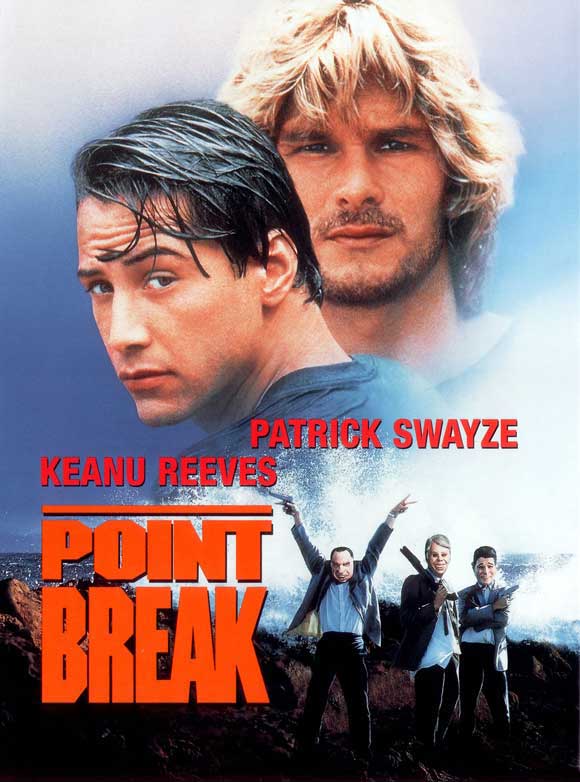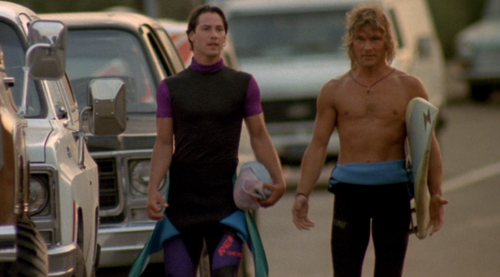 I have a confession to make: people have been telling me for years to watch Point Break, and I always blew them off. "Sure it's a great genre film," I thought, "but the genre is action and the film is about bank robbing surfers." Oh, Anne Marie. You did not give bank robbing surfers (who also skydive, by the way) enough credit. After having watched it (twice in a row), I confess that Point Break is quite possibly the perfect early 90s action flick: that brief bridge between the buffed up ridiculousness of 80s action movies, and the self-serious grittiness of later 90s action films.
I have a confession to make: people have been telling me for years to watch Point Break, and I always blew them off. "Sure it's a great genre film," I thought, "but the genre is action and the film is about bank robbing surfers." Oh, Anne Marie. You did not give bank robbing surfers (who also skydive, by the way) enough credit. After having watched it (twice in a row), I confess that Point Break is quite possibly the perfect early 90s action flick: that brief bridge between the buffed up ridiculousness of 80s action movies, and the self-serious grittiness of later 90s action films.
It's a space and genre that Kathryn Bigelow and James Cameron (who were married in 1989 and divorced in 1991, the same year Point Break came out) occupied gleefully. Point Break was a collaboration between the two writer/directors (though because of Writer's Guild rules, neither's name appears in the writing credits). Together, they created a spectacle-driven, tightly-plotted action movie that manages to both poke fun at, and take advantage of, the hyper-macho tropes of the genre. Action was, after all, the genre of Stallone and Schwarzenegger's muscles, as well as Willis and Gibson's swagger. A lot has been written about movie masculinity and homoeroticism in action films, but I believe that what makes Point Break so good, beyond the adrenaline-high sports scenes and the tense action, is the way director Kathryn Bigelow examines (with a thankfully very thorough lens) the men in her film.
Point Break is a film that improbably can have its beef-cake and eat it too.

On a purely shallow level, there's a lot of joy to be gained from the visual spectacle of watching a very beautiful man like Keanu Reeves (playing an uptight FBI agent Johnny Utah) pursue another beautiful man (Patrick Swayze as the surfer/villain Bodhi) while both are shirtless or wearing wetsuits. Unlike in her first film, Bigelow doesn't explicitly sexualize her main male characters, but there are more than a few lingering looks by the camera. Considering that the film is from Johnny Utah's perspective, the idealized way that Bodhi is introduced - first as a lone figure cutting through waves, then as a wethaired beach god strolling through the sand - feels less like an introduction of an antagonist than it should. It feels more like an introduction for a lover - even Utah's love interest doesn't get such a romanticized first scene.*
*I love Lori Petty with all my heart, but the girl had Ambient Gay swirling around her even before starring in Tank Girl and A League Of Their Own. A less convincing love interest/Gay Away could not have been chosen. She's a lot of fun with the one-liners, though.
But this homoerotic relationship between pursuer and pursued in an action movie is nothing new. What is new is how Bodhi redefines masculinity for his admiring pursuer. Point Break is awash in masculine stereotypes: by-the-book FBI Agents (John C. McGinley), foulmouthed buddy cops (Gary Busey), violent anarchists, stoners, and sports fiends populate Johnny Utah's world as he tries to unmask his bank robber. Bodhi presents Johnny Utah with a freer alternative: masculinity based on motion, where the only way to define yourself is by testing yourself, where crime can happen without violence, and petty worldly problems get swallowed by waves. Johnny Utah, former college athlete, clearly idolizes Bodhi's adrenoline-fuelled zen. Even when that zen turns out to be false, the bond that they form causes each to make mistakes born of mercy on the other's behalf. It also leads to the most iconic (and parodied) scene in the film, when, at the end of a heart-pounding foot chase, Johnny has to decide whether or not to shoot Bodhi.

This peculiar mix of pseudo-zen, ridiculous plot twists, well-edited action, and subtext is what makes Point Break unique. The remake, coming later this year, seems to have at least the action and plot twists down, but from the look of the trailer, it's taking itself and its macho characters way too seriously. That's a shame, because if anything can be learned from Bigelow's action surfer heist movie, it's this: nothing's more fun than just riding the ridiculous wave.

This month on Women's Pictures...

7/16 - Strange Days (1995) - Bigelow directed this LA-based cop thriller written by her ex-husband, James Cameron. (Amazon Prime) (Netflix)
7/23 - K-19: The Widowmaker (2002) - Hands down the most requested film after Point Break, this film follows Harrison Ford racing to prevent a nuclear holocaust via submarine. (Amazon Prime) (Netflix)
7/30 - The Hurt Locker (2008) - The film that put Bigelow's name down in history as the first female director to win the Academy Award is a thriller about a bomb squad in the Iraq War. (Amazon Prime)